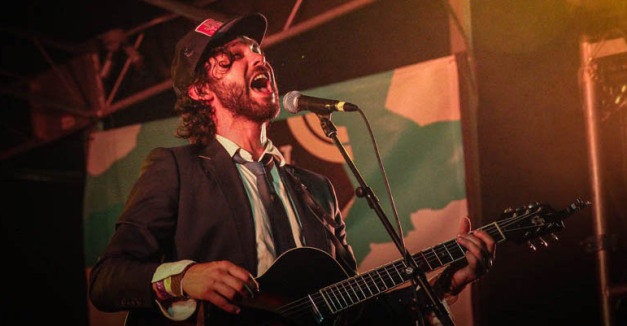The complicated, driving folk of Shakey Graves’ 2011 debut, Roll The Bones, has an endless quality to it.
Austin songwriter Alejandro Rose-Garcia puts his heel into his suitcase-kickdrum and picks snaking grooves on his palm-muted guitar in current after current. If his hands don’t give out or if the groove doesn’t fizzle, what could stop it?
More recently, you can credit Rose-Garcia’s partnership with singer/songwriter Esmé Patterson with being a guiding hand. In Shakey Graves’ Oct. 2014 album And The War Came, they join voices in part-theater, part-acrobatics. The final turn is clear harmonies and lo-fi folk rock soundscapes that open the group up for sing-a-longs and playing bigger venues, like, say, Omaha’s Waiting Room tonight and three straight nights at Denver’s Bluebird Theater later this week.
Tonight’s Waiting Room show sold out over the weekend, so if you’re still looking for a ticket, look to the black market.
If you’re not familiar with Shakey Graves’ current live show, this brief phone conversation with Rose-Garcia might illuminate a few things. For more on Patterson, who opens tonight’s show, we ran this interview with her last week.
Hear Nebraska: I remember you saying in an interview several months ago making And The War Came, you talked about stepping outside of a comfort zone. “Curious” was the word you used. Does that curiosity feel affirmed when you sell out a bunch of shows [like this]?
Alejandro Rose-Garcia: Definitely. I sort of feel like that would have happened maybe without that album. Maybe. It’s a little bit of a two-sided thing. But definitely when fans come and request songs off that album, it feels very validating. But I still feel like we’re … still getting people used to what’s going on.
HN: Is there any part of the size of the second album you think people are really liking? Or that makes you want to expand it even further?
AR: Yeah, that’s the idea. The next realm I guess we’re gonna go into is going to be even a little bit different than this last album. I just thought it was important to get people used the concept that the sound may change. There’s a lot of interested music to explore, and I think I’m just starting to get the hang of it.
HN: I saw you play a couple shows at SXSW when I was down there [last March]. At both, you sang with Esmé [Patterson]. At its best, that looks like a really symbiotic, in-the-moment performance relationship. For you as an actor, do similar principles of vibing and listening and feeling like if you’re working together it can elevate the situation … do those apply here, as well?
AR: Yeah, they’ve got to. It’s got to apply to everyone you work with.
HN: When I’ve watched you guys live and in videos do “Dearly Departed,” it seems like there are different wrinkles and rhythms every time. How important is spontaneity?
AR: Pretty important. I’d say flexibility is more important. If something goes wrong or the show wants to go in a certain way, you let it. But it’s also important to stick to your guns and be on top of what you’re doing. I prefer a fine blend between the two of those things.
HN: When you say “go with someone when they’re trying something,” can you think of a given example of what that would be?
AR: Yeah, it’s a lot like improv where there’s a set of rules, but you can’t keep switching shit up. Like, “Oh, now we’re in a pirate theme!” There’s tons of flexibility [though], in the intro to the song … whether you try and lead people in clapping or singing.
HN: On “Dearly Departed,” with the man and woman singing to each other and taking the different parts, there are some Cash-Carter resonances, but on “Call It Heaven,” for instance, your voices really do more to elevate both the masculine and feminine sides of the song. Do you feel transcendent moments like that happening?
AR: The writing of all those songs was kind of like that. We weren’t really writing specifically about our own personal experiences or anything. Even since writing them, I’ve fallen into certain aspects of what they’ve hinted at. It’s always that question of the chicken or the egg, whether the song or experience came first.
HN: You’ve talked about your fondness for things that feel classical, like 3/4 time or your suitcase drum, and people pick up on some of the old timey things going on in your music. Are there ever moments of self-checking where you stop and make sure this is true to what you want Shakey Graves to be and for it to feel new, and not, say, a really good version of something that was done throughout the 20th century?
AR: I guess so, to a certain degree. It’s not that specific or dire in any way. I think I have to check in more and make sure I’m not being too forward with my choices, as opposed to I don’t think old school influences are ever inappropriate. But things can get a little far from the dock, and I try to keep them under control.




